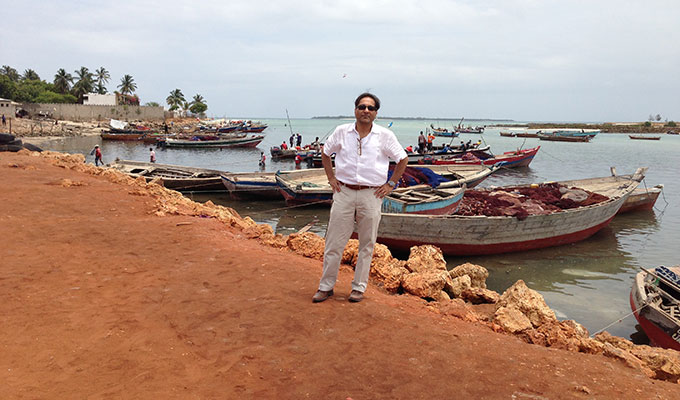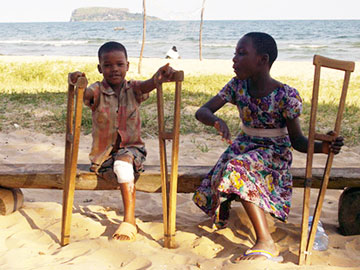Next story: Time To Cleanse
For Health and Strength
by Jamie Moses


After years of helping needy patient in Tanzania, Dr. Riyaz Hassanali is now helping to bring the country a top-flight health clinic
In November 2000, Dr. Riyaz Hassanali’s charitable work in Tanzania was the Thanksgiving Day cover story of Artvoice. The focus of that seasonal “giving thanks” article was to draw attention to those who give. Fourteen years later, the Amherst cosmetic surgeon is still traveling to Tanzania each year for charitable purposes, however, he was anxious to point out that there’s a benefit for him, as well.
“My trips to Tanzania are certainly helpful to people I work with there, but you know they’re good for me, too, a needed break from routine pressures,” said Dr. Hassanali. “When you go to a place like Tanzania you don’t worry about insurance company reimbursements and overhead expenses or malpractice insurance costs and all that, because what you’re doing is just true medicine for a people in great need. It makes you remember why you went into medicine in the first place.
“I come from Tanzania, and, like much of Sub-Saharan Africa, you’ll find the worst extremes of poverty and illness there. Simple things we take for granted here are missing, like clean water, for example. Eighty percent of Tanzanians don’t get clean water. What is the result? Dysentery and diarrhea are a big problem. Infection is a huge problem. Often it’s infection compounded by diabetes, which they aren’t even aware they have. You may not realize it, but a small infection, when untreated, can grow to be a crippling or even fatal event. People in rural communities wake up with a little sore one morning and, because travel to the city is so expensive, it goes undiagnosed and untreated for months. What happens eventually is that by the time they reach a doctor many of these people have to get an amputation. You see a ton of people in Tanzania walking around with amputations.
“In this country how do we treat infection? We swab, we culture, figure out exactly what the infecting organism is, and treat it appropriately. We have oral antibiotics, intravenous antibiotics, hydrotherapy, lasers, skin grafts, and a multitude of ways to treat infections. They don’t have access to any of that in Tanzania or anywhere else in Sub-Saharan Africa. I saw patients walking into the clinic where their foot was about to fall off from gangrene. Toes were about to fall off. The doctor tells them they need to go to the hospital to get this amputated. They don’t have the money to get it amputated so the gangrene just keeps traveling, and they say, ‘Well, I’m just going to go back to my village to die.’ It’s very sad.
On his most recent trip in February, Dr. Hassanali was working on a project with his father-in-law, a real estate developer who desires to build a top-quality health clinic on a piece of land he owns.
“I was there looking for a way to help my father-in-law improve the healthcare in the region by bringing in Western technology and services to a country that has been neglected because of extreme poverty. They have hospitals in Dar es Salaam, but certainly not hospitals that by our standards in the West would be acceptable. When a doctor performs a surgery in Tanzania, there are droppings from mice on the floor; there’s mold in the operating room; there’s no temperature control, so it’s hot and sweaty. There may not be any light if the generator isn’t working, and so they may be operating with light from a torch.
“So the wealthy and the expatriates, if they get sick they get on a plane and fly to Europe or India, which seems to be the most common destination for medical treatment. The idea is that this new clinic would be sufficiently modern with the best technology and staff to service the needs of the wealthy and the expatriates, and that revenue from these wealthier patients would help subsidize treatment of the less fortunate.”
Building a facility like Dr. Hassanali is talking about seems overly ambitious, to say the least. However, the timing may be perfect for just such an endeavor. When Shell Oil and British Petroleum searched for hydrocarbons in the 1950s and early 1960s, they found little natural gas and even less oil. Fast-forward 60 years and new technology has allowed geologists to identify large offshore natural gas fields that have put Tanzania firmly on the global energy map. Over the past three years, several oil companies have set up shop there, including ExxonMobil, Shell, Petrobras, and others.
“The need for improved healthcare and other needs has suddenly has become essential,” said Dr. Hassanali. “The government is incentivizing projects because they have all these multi-national companies that have moved to Tanzania and they want to make sure that all their needs are being met, from infrastructure, schools, healthcare facilities to restaurants, hotels, and so on and so forth.”
When talking to Dr. Hassanali, his excitement over this project is very evident. It’s clear that the energy he derives from his work in Tanzania is something quite different from what he derives from his daily practice in Amherst.
“This kind of work is invigorating for the soul,” he said. “It grounds you, and makes you feel there’s a purpose for why you went into medicine in the first place. There are many doctors who have found the same thing to be true. I would encourage any doctor who is not engaged in this type of work, especially young doctors, to do it. It doesn’t have to be Africa; it can be here in your backyard. But giving up your time without expecting anything in return monetary wise, that’s what separates us from those who are focused only on money. The reward is priceless, better than money. You come back from working a couple weeks in a place like Tanzania and your attitude changes and things bother you less, because you take your absolute worst day in Buffalo and it doesn’t compare to an average day in Dar es Salaam.”
blog comments powered by Disqus|
Issue Navigation> Issue Index > v13n10 (Week of Thursday, March 6) > For Health and Strength This Week's Issue • Artvoice Daily • Artvoice TV • Events Calendar • Classifieds |









 Current Issue
Current Issue